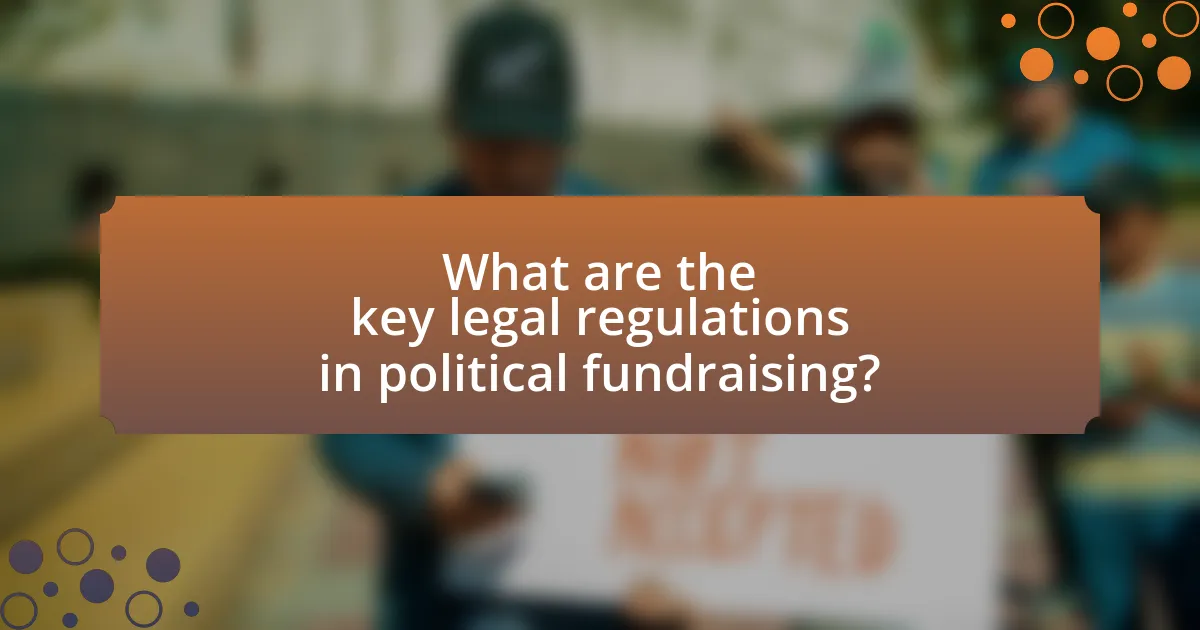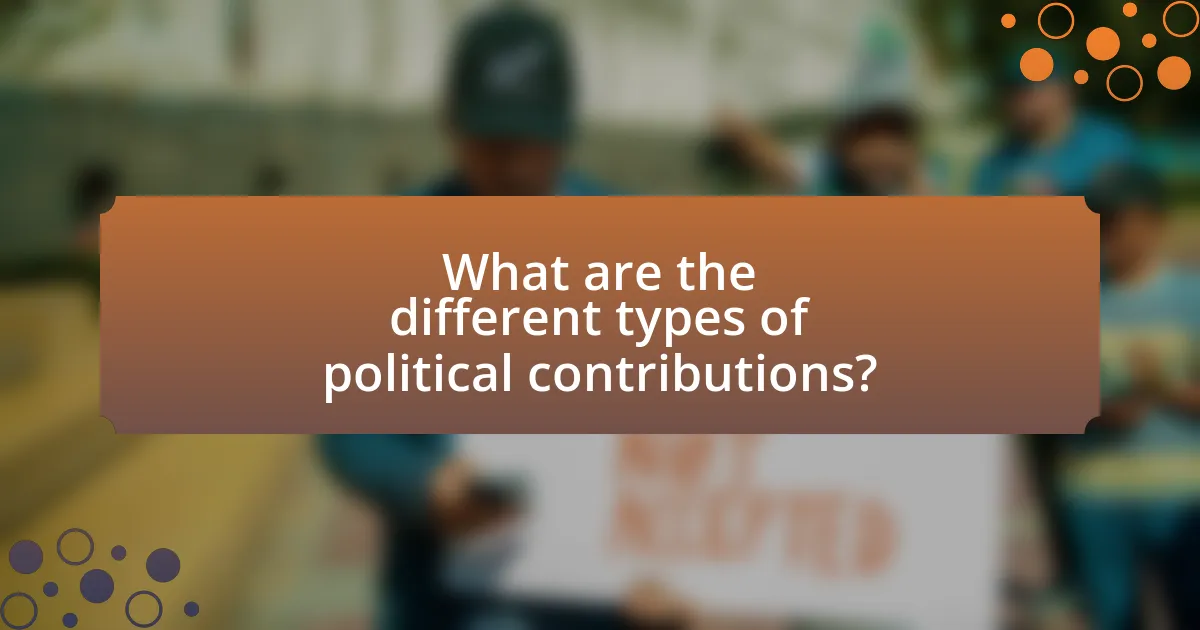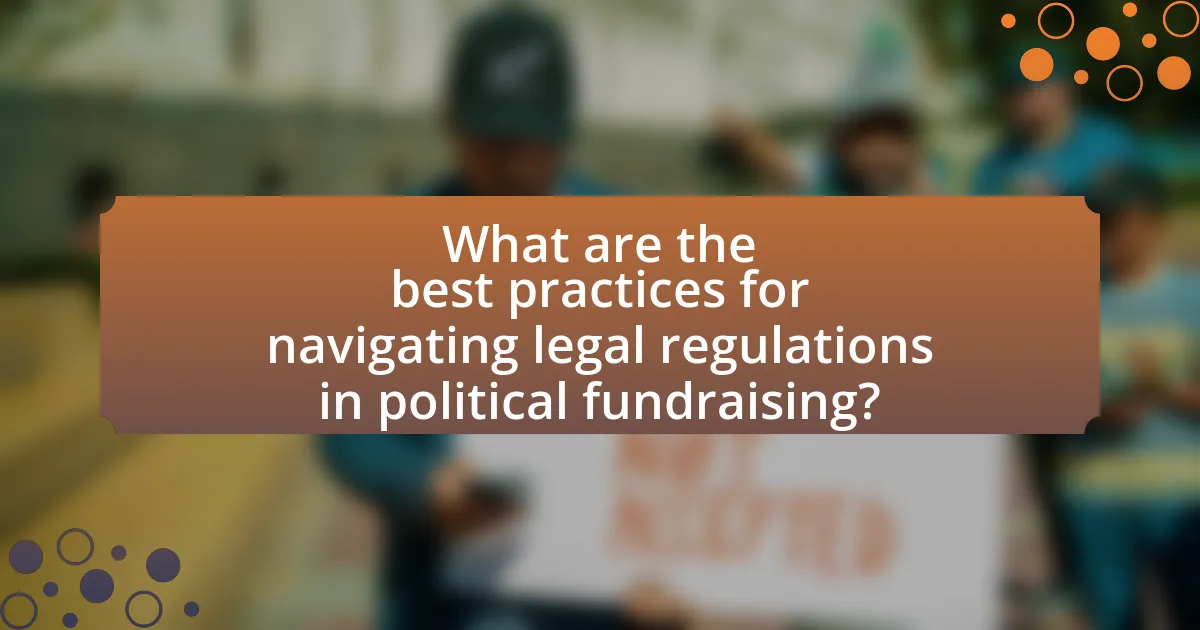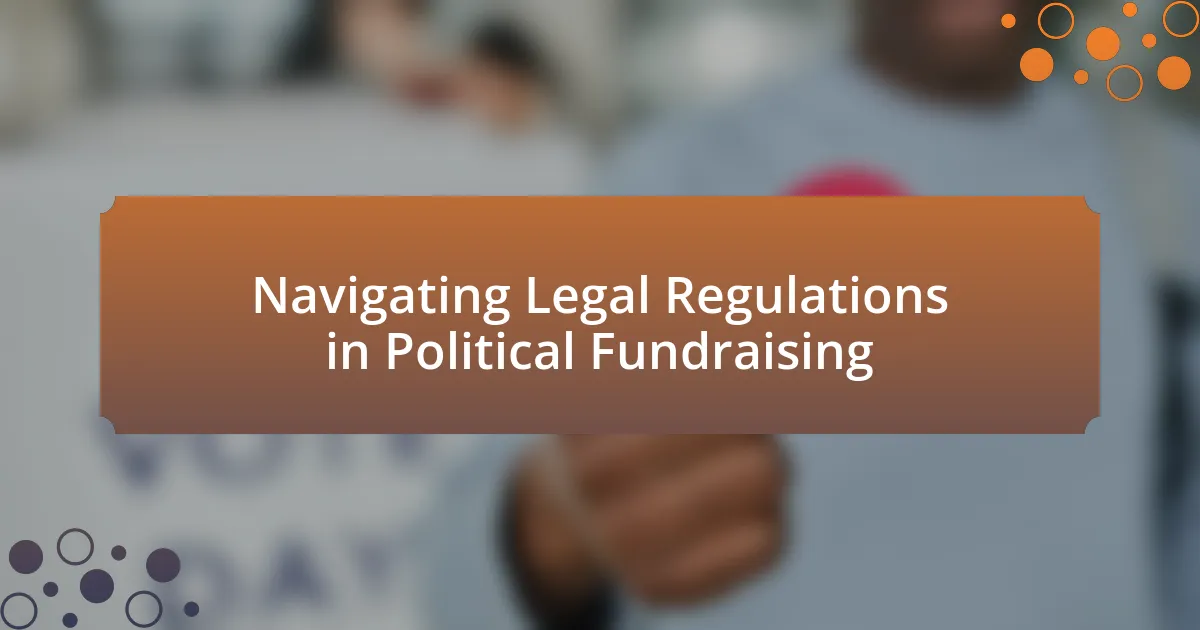The article focuses on navigating legal regulations in political fundraising, primarily governed by the Federal Election Commission (FEC) rules and various federal and state laws. It outlines key regulations, including contribution limits, disclosure requirements, and prohibitions on foreign contributions, emphasizing the importance of compliance to maintain transparency and prevent corruption. The article also distinguishes between different types of contributions, such as individual and corporate donations, and discusses the roles of Political Action Committees (PACs) and Super PACs. Additionally, it addresses the challenges campaigns face in adhering to these regulations and offers best practices for ensuring compliance and effective fundraising strategies.

What are the key legal regulations in political fundraising?
Key legal regulations in political fundraising include the Federal Election Commission (FEC) rules, which govern contributions and expenditures for federal elections. These regulations limit the amount individuals and organizations can contribute to candidates and political parties, require disclosure of contributions over a certain threshold, and prohibit foreign contributions. For instance, individuals can contribute a maximum of $2,900 per election to a candidate, as established by the FEC. Additionally, political action committees (PACs) must register with the FEC and adhere to specific contribution limits and reporting requirements. These regulations are designed to promote transparency and prevent corruption in the electoral process.
How do federal laws impact political fundraising activities?
Federal laws significantly regulate political fundraising activities by establishing contribution limits, disclosure requirements, and prohibitions on certain sources of funding. The Federal Election Commission (FEC) enforces these laws, which include limits on individual contributions to candidates, political parties, and political action committees (PACs), ensuring transparency and fairness in the electoral process. For instance, as of 2021, individuals can contribute a maximum of $2,800 per election to a candidate, and these contributions must be reported to the FEC, promoting accountability. Additionally, federal laws prohibit foreign entities from contributing to U.S. elections, safeguarding the integrity of the political system.
What are the main federal statutes governing political contributions?
The main federal statutes governing political contributions are the Federal Election Campaign Act (FECA) and the Bipartisan Campaign Reform Act (BCRA). FECA, enacted in 1971 and amended several times, regulates the financing of federal elections, including contribution limits and disclosure requirements. BCRA, passed in 2002, further amended FECA by prohibiting soft money contributions to national political parties and imposing stricter rules on the financing of electioneering communications. These statutes collectively establish the legal framework for political contributions in the United States, ensuring transparency and limiting the influence of money in politics.
How do federal regulations differ from state laws in political fundraising?
Federal regulations in political fundraising primarily set nationwide limits on contributions and require disclosure of donors, while state laws can vary significantly in terms of contribution limits, reporting requirements, and permissible fundraising activities. For example, the Federal Election Commission (FEC) establishes contribution limits for federal candidates, which are currently set at $2,900 per election from individuals, whereas some states may allow higher or lower limits or have no limits at all for state and local candidates. Additionally, federal law mandates that certain organizations, like political action committees (PACs), must register and report their contributions and expenditures, while state laws may have different thresholds for registration and reporting, leading to a patchwork of regulations across the country.
What role do state laws play in political fundraising?
State laws significantly regulate political fundraising by establishing contribution limits, disclosure requirements, and permissible funding sources. These laws vary by state, impacting how candidates and political organizations raise and spend money. For instance, some states impose strict limits on individual contributions to candidates, while others may allow larger donations. Additionally, state laws often mandate that candidates disclose their fundraising activities and expenditures, promoting transparency and accountability. According to the National Association of Secretaries of State, 47 states have laws governing campaign finance, highlighting the critical role these regulations play in shaping the political fundraising landscape.
How can state-specific regulations affect fundraising strategies?
State-specific regulations can significantly impact fundraising strategies by dictating the methods and limits of contributions. For instance, some states impose strict contribution limits on individual donors, which can restrict the amount of money a campaign can raise from a single source. Additionally, regulations may require detailed reporting of contributions and expenditures, influencing how campaigns allocate resources and communicate with potential donors. In states with stringent transparency laws, campaigns may need to invest more in compliance measures, diverting funds from actual fundraising efforts. These variations in state laws necessitate tailored fundraising approaches that align with local legal requirements, ultimately shaping the overall strategy and effectiveness of political fundraising efforts.
What are common state-level restrictions on political contributions?
Common state-level restrictions on political contributions include limits on the amount individuals and organizations can donate to candidates, parties, and political action committees (PACs). For instance, many states impose contribution limits that vary by the type of donor, such as individuals, corporations, or unions, with some states capping individual contributions at amounts ranging from $1,000 to $5,000 per election cycle. Additionally, states often require disclosure of contributions above a certain threshold, typically $100, to promote transparency. Some states also prohibit contributions from foreign entities and impose restrictions on the timing of contributions, particularly during election periods. These regulations aim to prevent corruption and ensure fair electoral processes.
Why is compliance with legal regulations crucial for political campaigns?
Compliance with legal regulations is crucial for political campaigns because it ensures transparency, accountability, and the integrity of the electoral process. Adhering to laws such as the Federal Election Commission regulations helps prevent illegal contributions and maintains public trust. For instance, the Bipartisan Campaign Reform Act mandates disclosure of campaign financing, which allows voters to make informed decisions based on the sources of funding. Non-compliance can lead to severe penalties, including fines and disqualification from the ballot, as evidenced by cases where candidates faced legal repercussions for failing to report contributions accurately. Thus, compliance not only safeguards the campaign’s legitimacy but also upholds democratic principles.
What are the potential consequences of non-compliance in political fundraising?
Non-compliance in political fundraising can lead to severe legal and financial consequences. Violators may face penalties such as fines, which can range from hundreds to thousands of dollars depending on the severity of the violation. Additionally, non-compliance can result in criminal charges, including felony charges for serious infractions, which can lead to imprisonment. Furthermore, candidates or organizations may be subjected to audits by regulatory bodies, such as the Federal Election Commission, which can disrupt fundraising efforts and damage reputations. Historical cases, such as the 2016 election violations, illustrate that non-compliance can also lead to disqualification from future elections or loss of donor trust, significantly impacting a campaign’s viability.
How can campaigns ensure they remain compliant with fundraising laws?
Campaigns can ensure compliance with fundraising laws by thoroughly understanding and adhering to federal, state, and local regulations governing political contributions. This includes registering with the appropriate election authorities, maintaining accurate records of all donations, and ensuring that contributions come from permissible sources, such as individuals and certain organizations, while avoiding prohibited sources like corporations in many jurisdictions. Additionally, campaigns should regularly consult legal experts or compliance specialists to stay updated on any changes in the law, as regulations can vary significantly by location and can change over time. For instance, the Federal Election Commission (FEC) provides guidelines and resources that outline contribution limits and reporting requirements, which are essential for maintaining compliance.

What are the different types of political contributions?
Political contributions can be categorized into several types, including individual contributions, corporate contributions, political action committee (PAC) contributions, and in-kind contributions. Individual contributions refer to donations made by private citizens to candidates or political parties, often subject to legal limits set by campaign finance laws. Corporate contributions involve funds donated by businesses to support political candidates or causes, which are regulated differently depending on jurisdiction. Political action committee contributions come from organizations that pool funds to support candidates, and they must adhere to specific regulations regarding donation limits and reporting. In-kind contributions consist of non-monetary support, such as goods or services provided to a campaign, which also have to be reported and valued appropriately. These categories are essential for understanding the legal framework governing political fundraising and ensuring compliance with regulations.
What distinguishes individual contributions from corporate donations?
Individual contributions are personal financial donations made by individuals, while corporate donations are funds provided by businesses or organizations. The key distinction lies in the source of the funds; individual contributions come from personal income, whereas corporate donations originate from company profits. Legal regulations often treat these two types of donations differently, with individual contributions typically having lower limits and stricter reporting requirements compared to corporate donations, which may be subject to different rules based on the jurisdiction. For instance, the Federal Election Commission (FEC) in the United States imposes a limit of $2,900 per election for individual contributions, while corporate donations can be subject to varying state laws and regulations.
How are individual contribution limits set and enforced?
Individual contribution limits are set by federal and state laws that establish maximum amounts individuals can donate to political candidates and parties. The Federal Election Commission (FEC) regulates these limits at the federal level, adjusting them periodically for inflation; for example, as of 2021, the limit for individual contributions to a candidate for federal office is $2,900 per election. Enforcement of these limits is carried out through mandatory reporting requirements, where candidates and political committees must disclose contributions, allowing for audits and investigations by the FEC or state election authorities to ensure compliance. Violations can result in penalties, including fines and legal action, thereby reinforcing adherence to the established contribution limits.
What regulations govern corporate contributions to political campaigns?
Corporate contributions to political campaigns are primarily governed by the Federal Election Commission (FEC) regulations, which prohibit direct contributions from corporations to candidates for federal office. The Bipartisan Campaign Reform Act of 2002, also known as McCain-Feingold Act, reinforced these restrictions by banning soft money contributions to national political parties. Additionally, the Supreme Court’s decision in Citizens United v. FEC (2010) allowed corporations to spend unlimited amounts on independent political expenditures, but they still cannot contribute directly to candidates. These regulations ensure that while corporations can influence elections through independent spending, they cannot directly fund candidates’ campaigns.
What are the implications of PACs and Super PACs in political fundraising?
PACs (Political Action Committees) and Super PACs significantly influence political fundraising by allowing individuals and organizations to contribute large sums of money to support candidates or causes. PACs can donate directly to candidates, subject to contribution limits, while Super PACs can raise and spend unlimited amounts independently of candidates, leading to increased financial influence in elections. For instance, in the 2020 election cycle, Super PACs spent over $1.5 billion, highlighting their role in shaping electoral outcomes. This dynamic raises concerns about transparency and the potential for disproportionate influence by wealthy donors on political processes and policy decisions.
How do PACs operate within the legal framework of political fundraising?
Political Action Committees (PACs) operate within the legal framework of political fundraising by collecting and distributing contributions to candidates, parties, and other PACs, adhering to regulations set by the Federal Election Commission (FEC). PACs must register with the FEC and comply with contribution limits, which, as of 2023, allow them to contribute up to $5,000 per candidate per election and $15,000 annually to a national party committee. Additionally, PACs are required to disclose their financial activities, including contributions and expenditures, ensuring transparency in the political fundraising process. This regulatory structure is designed to prevent corruption and promote accountability in campaign financing.
What are the differences between PACs and Super PACs in terms of fundraising capabilities?
PACs, or Political Action Committees, have limited fundraising capabilities compared to Super PACs. PACs can only raise and spend money within strict limits set by federal law, allowing contributions of up to $5,000 per individual per year. In contrast, Super PACs can raise unlimited amounts of money from individuals, corporations, and unions, as long as they do not coordinate directly with candidates or political parties. This distinction is rooted in the 2010 Supreme Court decision in Citizens United v. FEC, which enabled Super PACs to operate without the same financial constraints as traditional PACs.
How do in-kind contributions fit into the legal landscape of political fundraising?
In-kind contributions are non-monetary donations that provide goods or services to political campaigns, and they are subject to specific legal regulations under campaign finance laws. The Federal Election Commission (FEC) mandates that in-kind contributions must be reported just like monetary donations, with their fair market value assessed and disclosed to ensure transparency and compliance with contribution limits. For instance, if a business provides advertising space to a candidate, the value of that space must be reported as an in-kind contribution, which counts against the campaign’s contribution limits. This legal framework aims to prevent circumvention of donation caps and maintain the integrity of the electoral process.
What qualifies as an in-kind contribution under current regulations?
An in-kind contribution under current regulations refers to non-monetary support provided to a political campaign, such as goods or services. This includes items like office supplies, advertising space, or volunteer labor, which have a measurable value and directly benefit the campaign. According to the Federal Election Commission, these contributions must be reported and valued at fair market rates to ensure compliance with campaign finance laws.
How should campaigns report in-kind contributions to remain compliant?
Campaigns should report in-kind contributions by accurately valuing and disclosing them in their financial reports to remain compliant with legal regulations. In-kind contributions, which include goods or services provided without charge, must be assigned a fair market value and reported as both income and an expenditure in the campaign’s financial statements. The Federal Election Commission (FEC) mandates that these contributions be documented with details such as the donor’s information, the nature of the contribution, and its value, ensuring transparency and adherence to campaign finance laws. Failure to report in-kind contributions correctly can lead to penalties and legal repercussions, as outlined in the FEC’s regulations on campaign finance.

What are the best practices for navigating legal regulations in political fundraising?
The best practices for navigating legal regulations in political fundraising include understanding federal and state laws, maintaining accurate records, and ensuring transparency in all financial transactions. Political entities must familiarize themselves with the Federal Election Commission (FEC) regulations, which set limits on contributions and require detailed reporting of fundraising activities. Additionally, organizations should implement robust compliance systems to track donations and expenditures, as failure to adhere to these regulations can result in significant penalties. For instance, in 2020, the FEC imposed fines totaling over $1 million for various violations, underscoring the importance of strict adherence to legal standards in political fundraising.
How can political campaigns effectively track and report contributions?
Political campaigns can effectively track and report contributions by implementing robust financial management software that complies with legal regulations. This software enables campaigns to record contributions in real-time, categorize them by source, and generate reports that meet federal and state reporting requirements. For instance, the Federal Election Commission mandates that campaigns disclose contributions exceeding $200, necessitating accurate tracking systems to ensure compliance. Additionally, utilizing online donation platforms that automatically log contributions can streamline the reporting process, reducing the risk of errors and ensuring timely submissions.
What tools and resources are available for compliance tracking?
Compliance tracking in political fundraising can be effectively managed using various tools and resources such as compliance management software, regulatory databases, and audit checklists. Compliance management software like ComplyAdvantage and LogicManager provides automated tracking of regulatory changes and compliance requirements, ensuring organizations stay updated. Regulatory databases, such as the Federal Election Commission’s database, offer access to essential information on campaign finance laws and reporting requirements. Additionally, audit checklists help organizations systematically verify adherence to legal standards, enhancing accountability and transparency in fundraising activities. These tools collectively support organizations in maintaining compliance with legal regulations in political fundraising.
How can campaigns educate their staff on legal fundraising practices?
Campaigns can educate their staff on legal fundraising practices through structured training programs that cover relevant laws and regulations. These programs should include comprehensive workshops led by legal experts who specialize in campaign finance law, ensuring that staff understand the intricacies of federal and state regulations. Additionally, providing access to updated resources, such as the Federal Election Commission guidelines and state-specific fundraising laws, reinforces knowledge. Regularly scheduled refresher courses and real-world case studies can further enhance understanding and compliance. Research indicates that organizations with ongoing training see a 30% increase in compliance rates, highlighting the effectiveness of continuous education in legal fundraising practices.
What strategies can campaigns implement to avoid legal pitfalls?
Campaigns can implement several strategies to avoid legal pitfalls, including thorough compliance training, regular audits, and clear documentation of all financial transactions. Compliance training ensures that all staff and volunteers understand the legal requirements surrounding fundraising, such as contribution limits and reporting obligations. Regular audits help identify any discrepancies or potential violations before they escalate into legal issues. Additionally, maintaining clear documentation of all financial transactions provides a transparent record that can be referenced in case of inquiries or audits by regulatory bodies. These strategies collectively minimize the risk of legal challenges and ensure adherence to political fundraising regulations.
How can campaigns conduct regular audits of their fundraising activities?
Campaigns can conduct regular audits of their fundraising activities by implementing a systematic review process that includes tracking all donations, expenditures, and compliance with legal regulations. This process involves maintaining detailed records of all financial transactions, categorizing them appropriately, and reconciling these records with bank statements to ensure accuracy. Additionally, campaigns should establish a timeline for audits, such as quarterly or biannual reviews, to assess compliance with federal and state fundraising laws, which require transparency and accountability in financial reporting. Regular audits help identify discrepancies, ensure adherence to contribution limits, and maintain the integrity of the campaign’s financial practices.
What role does legal counsel play in political fundraising compliance?
Legal counsel plays a critical role in ensuring compliance with laws governing political fundraising. They provide guidance on federal, state, and local regulations, helping political entities navigate complex legal frameworks. Legal counsel reviews fundraising materials, advises on contribution limits, and ensures proper reporting to regulatory bodies, thereby minimizing the risk of legal violations. For instance, the Federal Election Commission mandates specific disclosure requirements, and legal counsel ensures adherence to these rules, which is essential for maintaining transparency and accountability in political fundraising activities.
What are common challenges faced in political fundraising compliance?
Common challenges faced in political fundraising compliance include navigating complex regulations, ensuring accurate reporting, and managing donor limits. Political organizations must adhere to federal, state, and local laws, which can vary significantly and change frequently, complicating compliance efforts. Accurate reporting is essential, as failure to disclose contributions or expenditures can lead to penalties; for instance, the Federal Election Commission reported over 1,000 enforcement actions in recent years due to reporting violations. Additionally, organizations must monitor donor limits to avoid exceeding contribution caps, which can result in fines or legal repercussions. These challenges require ongoing education and resources to maintain compliance effectively.
How can campaigns address misunderstandings about contribution limits?
Campaigns can address misunderstandings about contribution limits by providing clear, accessible information about the specific regulations governing contributions. For instance, campaigns can create educational materials that outline the legal limits for individual and corporate contributions, as established by the Federal Election Commission, which sets the maximum allowable contributions for federal elections. Additionally, campaigns can utilize social media platforms and community outreach to disseminate this information, ensuring that potential donors understand the rules and the rationale behind them. By actively engaging with the public and clarifying common misconceptions, campaigns can foster transparency and trust, ultimately encouraging compliance with contribution limits.
What steps can be taken to adapt to changing regulations in political fundraising?
To adapt to changing regulations in political fundraising, organizations should implement a proactive compliance strategy. This involves regularly monitoring legislative updates and engaging legal experts to interpret new laws. For instance, the Federal Election Commission (FEC) frequently updates its guidelines, and staying informed can prevent violations. Additionally, training staff on compliance requirements ensures that all team members understand the legal landscape. Utilizing technology, such as compliance management software, can streamline the tracking of contributions and expenditures, ensuring adherence to regulations. These steps collectively enhance an organization’s ability to navigate the complexities of political fundraising laws effectively.
